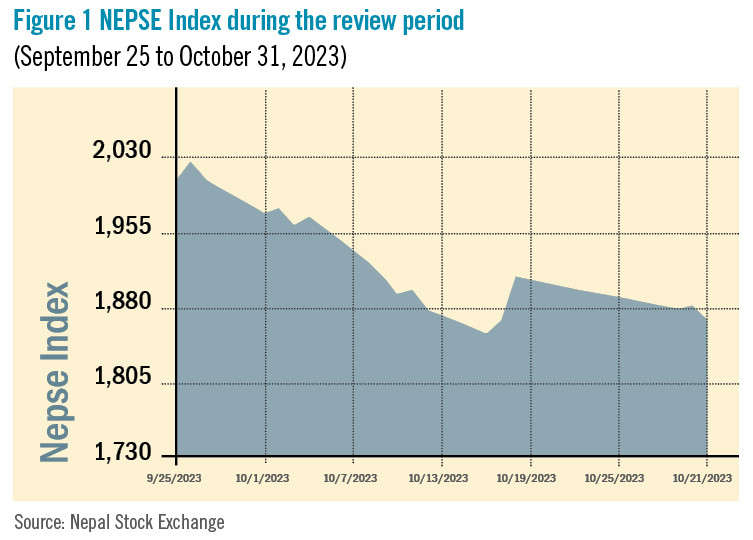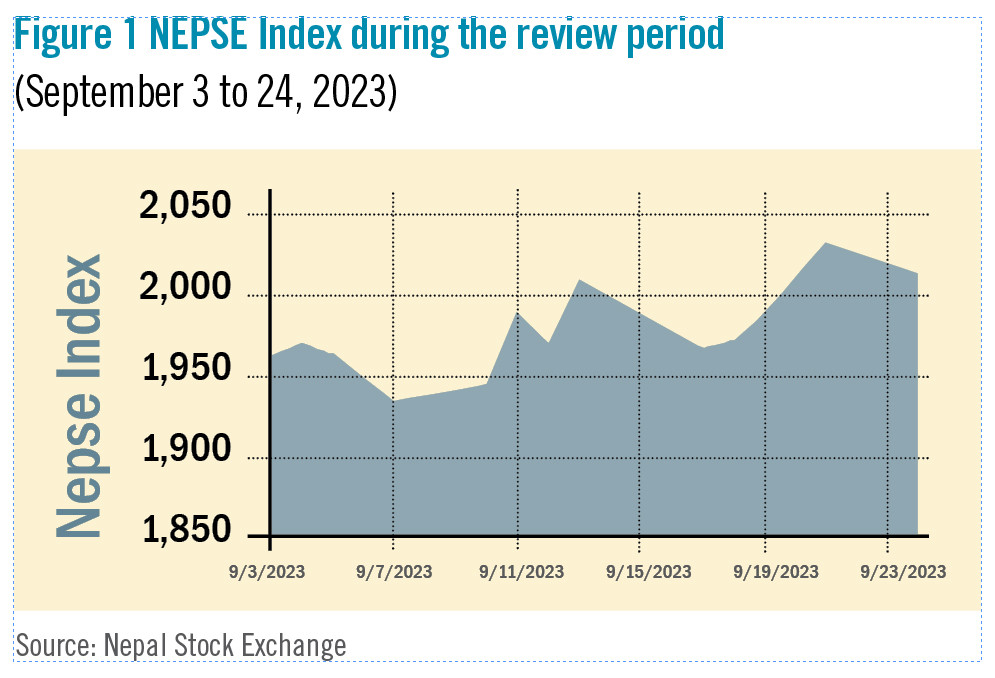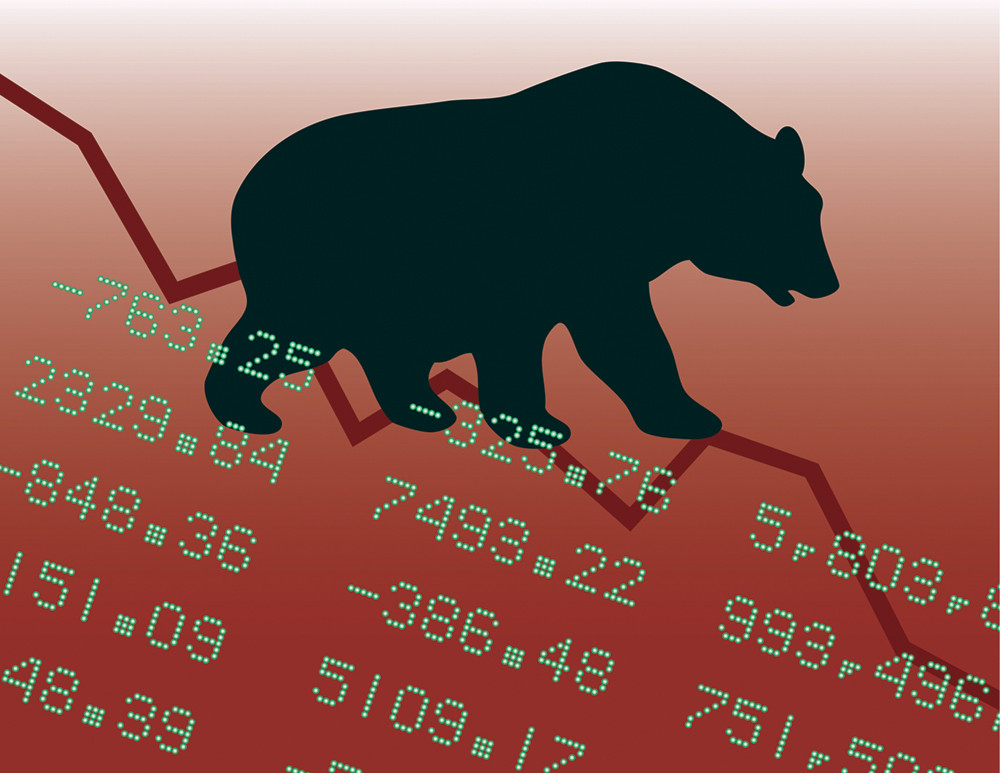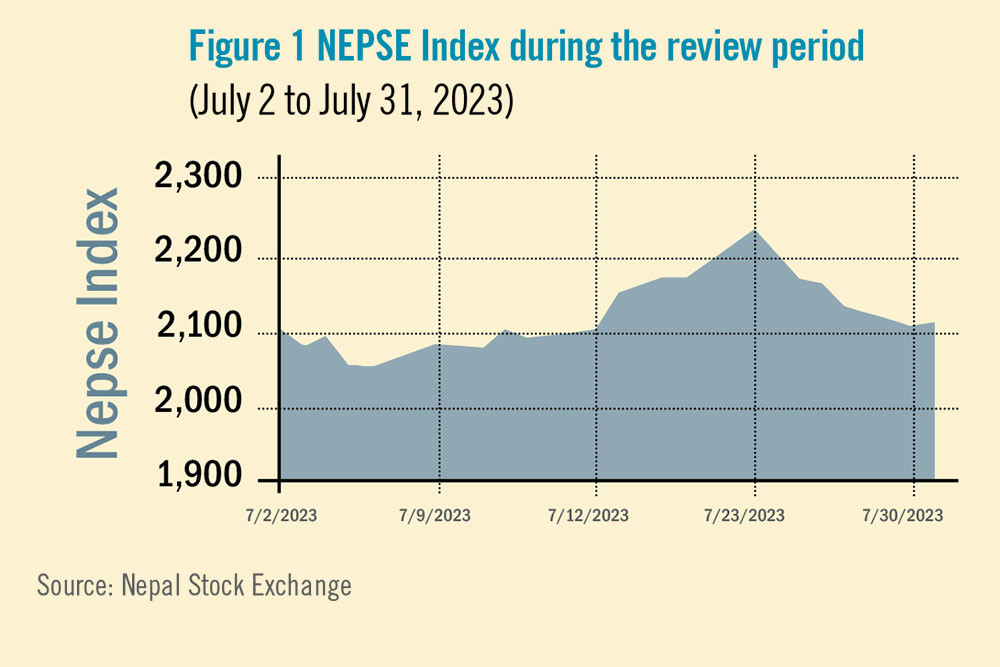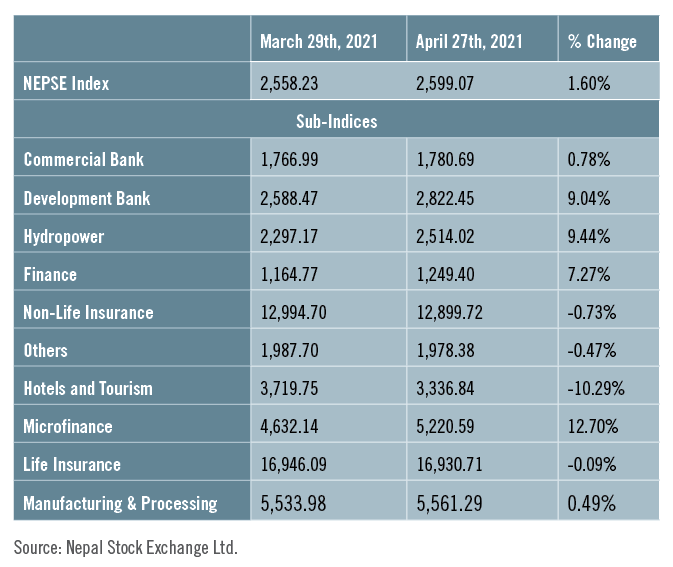
During the review period of March 28 to April 27, the Nepal Stock Exchange (NEPSE) index went up by a staggering 40.84 points (+1.60%) to close at 2,599.07 points. The secondary market continued with its upward momentum after crossing the long-term psychological threshold of 2,100 points by sailing past 2,700 points on the day of the Nepali New Year 2078 B.S closing at an all-time high of 2,735.40 points. Nonetheless the upward momentum was short lived with the rising uncertainties due to deepening Covid 19 crisis, and the market has since been on a downward spiral. As a result, the total market volume during the review period decreased substantially by 41.69% and stood at Rs 136.78 billion.
During the review period, contrary to the previous review period, six of the sub-indices landed in the green zone while four fell in the red-zone.
Microfinance sub-index (+12.70%) was the biggest gainer as share value of Womi Microfinance (+Rs 717), Janautthan Samudayic Microfinance (+Rs 660) and Global IME Microfinance (+Rs 583) went up. Hydropower sub-index (+9.44%) was second in line with increase in the share value of Chhyangdi Hydropower (+Rs 85), Upper Tamakoshi Hydropower (+Rs 83), and Radhi Bidhyut Hydropower (+Rs 65). Development Bank sub-index (+9.04%) followed suit with rise in share value of Sindhu Development (+Rs 76), Excel Development (+Rs 71) and Green Development (+Rs 52). Likewise, Finance sub-index (+7.27%) surged as share value of Pokhara Finance (+Rs 51), Gurkhas Finance (+Rs 43) and Multipurpose Finance (+Rs 36) went up. Commercial Bank sub-index (+0.78%) also rose marginally with increase in share value of Nabil Bank (+Rs 51), NIC Asia Bank (+Rs 41) and Sidhhartha Bank (+Rs 23). Similarly, Manufacturing & Processing sub-index (+0.49%) witnessed a rise in the share value of Himalayan Distillery (+Rs 175) and Shivam Cements (+Rs 18).
Contrarily, Life Insurance sub-index (-0.09%) witnessed a decrease in the share value of Nepal Life Insurance (-Rs 153), Life Insurance Company (-Rs 104) and National Life Insurance (-Rs 48). Following this, Others sub-index (-0.47%) decreased with drop in the share prices of Nepal Telecom (-Rs 51). Similarly, Non-Life Insurance sub-index (-0.73%) also saw fall in the share value of Rastriya Beema Company (-Rs 1700), Shikhar Insurance (-Rs 129) and Premier Insurance (-Rs 84). Likewise, with looming uncertainties, Hotels and Tourism sub-index (-10.29%) was the biggest loser with drop in the share prices of Oriental Hotels (-Rs 69), Taragaon Regency Hotel (-Rs 50) and Soaltee Hotel (-Rs 17).
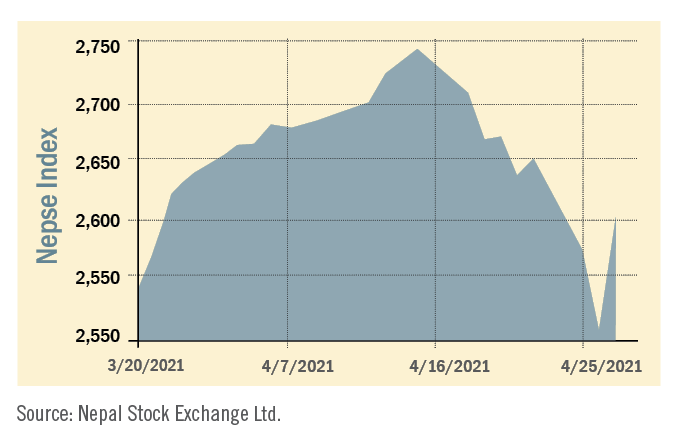

News and Highlights
The Securities Exchange Board of Nepal (SEBON) has added nine additional new institutional investors to be eligible for the book-building process. With this the total number of institutional investors has reached 83. Besides this, in the wake of the second wave of the Covid 19 pandemic, SEBON has brought into effect new arrangements to minimise physical traffic as much as possible in the activities conducted by Nepal Stock Exchange (NEPSE). As per the arrangements, documents to be submitted by investors to NEPSE as well as the bank guarantee offered by the member brokers can be done through email. These arrangements are made to make the purchase and sale of shares easier and convenient. On the public issue front, during the review period, the Securities Exchange Board of Nepal (SEBON) has approved the Initial Public Offering (IPO) of CEDB Hydropower worth Rs 251.8 million and Madhya Bhotekoshi Hydropower worth Rs 1.5 billion. Sunrise Capital has been appointed as the issue manager for CEDB Hydropower whereas Global IME Capital has been appointed as the issue manager for Madhya Bhotekoshi. SEBON has also approved two debenture issuances namely: ‘15 years, 4%, NMB Urja Rinpatra (Energy Bond) - 2092/93’ by NMB Bank and ‘10 years, 9%, Shangrila Development Bank Debenture 2087’ by Shangrila Development Bank. SEBON has added the IPO issue of Upper Solu Hydro Electric Company worth Rs 330 million to its pipeline. NMB Capital has been appointed as its issue manager.Outlook
Post February-March 2020 panic sell at the beginning of Covid 19 crisis, it is evident that the secondary market has attracted thousands of new investors and is on a bullish trend. It was possible particularly because of the timely infrastructure development supporting online trading driven by the pandemic. As the threat of the second wave of Coronavirus continues to grow, investors seem to be cautious about the market movement as indicated by decreasing market volume and correction. But as majority of listed companies have rolled out attractive third quarter financial results, the market is likely to sustain its current trend.
Published Date: May 30, 2021, 12:00 am
Post Comment
E-Magazine
RELATED Beed Take


